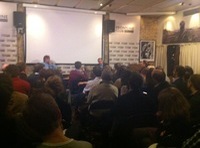Full House UK Premiere Screening: Under Fire: Journalists In Combat
By Nicky Armstrong
Half way through the film the ripple effect that war has on journalists and the stresses that leak out from being present at such horrific moments in people’s lives are laid bare for the audience to see. The question of morals, as well as dealing with your own problems and family life back home seem to be put to the back of the reporters minds; the job in hand is their only real focus at the time. But these problems cannot be ignored, and the psychological cost of covering a war really becomes apparent.
PTSD (Post Traumatic Stress Disorder) is a repetitive premise throughout the film. The reality of dealing with war once you are out of combat is a different task all together. When producer Anthony Feinstein was asked if every journalist suffers from Post Traumatic Stress Disorder his answer was no, but the reality is that journalists, and indeed soldiers have a much higher risk of suffering from PTSD than the average person – the way each individual journalist deals with the trauma is different. It was made clear by the journalists in the film that they seek no sympathy for their troubles, after all these are their decisions, but this does not stop the overwhelming feeling of guilt that comes with the job. As mothers and fathers, with families back home, it is hard to withhold emotion when witnessing events where they are faced with the dilemma of ‘report or help’.
The film shows that a recurring side effect from reporting is that most of the journalists seem to suffer from nightmares, “it is not a normal nightmare, it is impounding and insisting,” and many use drink to block out the memories. It seems that journalists learn to cope with these intrusive thoughts, but not all are successful.
Why do you do it? Was the key question asked of Finbarr O’Reilly, a Reuters reporter featured in the film and present at last night’s screening; “I don’t enjoy being scared” he stated, and certainly the loss of friends such as Tim Hetherington has shifted his focus and left him questioning his future. But the truth is these pictures need to be taken, and as one reporter said in the film “you will never feel as alive as when you are staring death in the face.”
It seems that news agencies are finally recognizing the stresses of reporting in combat and that PTSD is a very real phenomenon among combat journalists that is starting to lose its stigma and is being accepted as reality. The nature of war reporting has changed over the years, journalists put themselves in highly volatile environments and many pay for it with their mental health and in some cases even their lives. Under Fire: Journalists In Combat is a film that addresses these issues.

